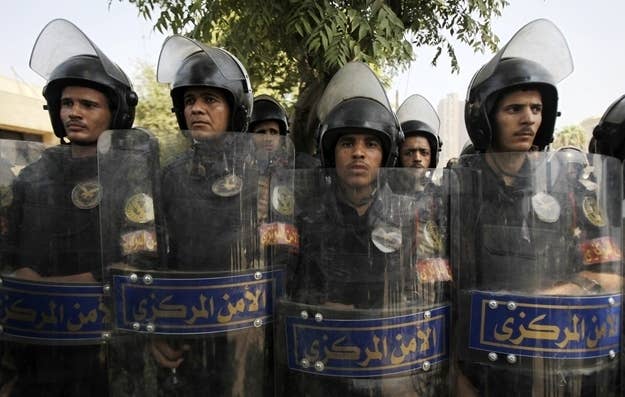
Ahmed Abu Salim was just a 10-minute drive away when Egyptian police stormed a building in Cairo's El-Marg district and arrested 14 men there for "practicing homosexuality."
The 33-year-old divorced father of two, who asked to be quoted using a pseudonym, said he had arranged to meet a friend there but was running late.
"I would have been arrested too, and then my life would be over, like them," he said. "The government is going to make an example of them."
Egyptian media gleefully reported that the men had been involved in "homosexual" acts at the center, which the news reports alternatively described as a health center and medical building, and that various illegal pills and stimulants had been found in the men's possession.
"Information had been received about the center's illegal activity, and that it welcomed perverted men and boys to practice immorality in its rooms. The investigation has proved the information correct; the center was raided, and 14 men were caught, in positions that are against religious precepts," reported the State-run Akhbar el-Youm newspaper. "Also, the management staff were caught along with a large quantity of pills and sexual stimulants. It emerged that the center only engages in this illegal activity in return for payments of between 50 and 200 pounds [$7–$28] for one encounter."
An Egyptian prosecutor ordered on Saturday that the men be held for four days. Egyptian officials said the men would be subjected to intrusive medical tests and forensic reports to determine whether or not they had taken part in "indecent acts."
"They are already guilty, no matter what the doctor finds on their bodies," said Abu Salim, who has struggled with being a gay male in Egypt for over a decade. "For men like them, there will be no sympathy."
The El-Marg district in which they were arrested sits on the dusty outskirts of Cairo, and is home to mostly working-class families.
Scott Long, a visiting fellow in the Human Rights Program of Harvard and former executive director of the LGBT Program at Human Rights Watch, wrote on his blog that the health center was little more than a converted apartment:
"I have at least one friend who has visited. It was a small gym and sauna, converted from a private apartment and operating as a business for years. It's well known in the surrounding streets; when my friend went there about three years ago — before the Revolution — and asked directions, the neighbors said 'Oh, the hammam', or baths, and pointed the way. The entry fee was 25 pounds back then. It's unlikely the price has gone up eightfold in the interim, so the figures the police gave (with the strong suggestion of prostitution) are probably nonsense. There is a good chance that the 'pills and sexual stimulants' the police found are vitamins, or even steroids."
Abu Salim, who said he had visited the health center on at least two previous occasions, called it a "safe place" for men who couldn't afford to go to some of the more upscale neighborhoods where Egypt's LGBT community gathered.
"If these men had been in Zamalek or Heliopolis, they would not have been arrested like this," he said. "But these men are men they can make an example out of."
He said that his friends in Egypt have been feeling increasingly under attack, and that there have been warnings that police were planning to target an LGBT center.
Since the uprising in Egypt swept away the Mubarak regime three years ago, things have gone from bad to worse for Egypt's LGBT community. Between 2001 and 2004, Hosni Mubarak's regime launched a crackdown on homosexual conduct, arresting and torturing thousands of people.
Following the revolution in 2011 and the ascension of the Islamist Muslim Brotherhood to power, even stricter laws and conditions were placed on the LGBT community.
Brotherhood leaders preached against homosexuality and publicly announced that "gay men are not real people."
In August 2012, Egyptian police arrested a man for leading a "gay sex network," and later that year vigilantes beat and detained four young men who they alleged were having sex in a car. The vigilantes were let go, and the four young men arrested.
Some briefly hoped that the fall of the Muslim Brotherhood and arrest of its leaders would allow a loosening of restrictions on Cairo's LGBT community.
But Ahmed, a gay rights activist who said he was detained by police twice last year, said that police have been increasingly targeting gay men.
"I have felt this and I know the community has felt that it is very dangerous for us right now," he said, adding that in clubs and restaurants that are well-known hangouts for the LGBT community, friends have taken turns keeping an eye out for police or vigilantes. "Police are hunting for us."
On his blog, Long wrote that Egyptian police are trying to salvage their credibility at the moment and ride the high tide of Egyptian nationalism and pride the armed services sweeping the country.
"Since the coup, the police go after Syrians, Palestinians, and other foreigners, because the wave of State-fostered xenophobia makes them applause-inducing targets," Long wrote. "But it never hurts to announce that you've picked up a few suspected homosexuals. What better paints you, corrupt and immoral though you may be, as a defender of the nation's morals?"
Abu Salim said that for now, he and his friends are planning on lying low.
"When I think how close I came to being arrested, it makes me very very afraid to go anywhere I used to go," he said. "They went after them first because they could, but I am afraid that soon nowhere will be safe for us."
